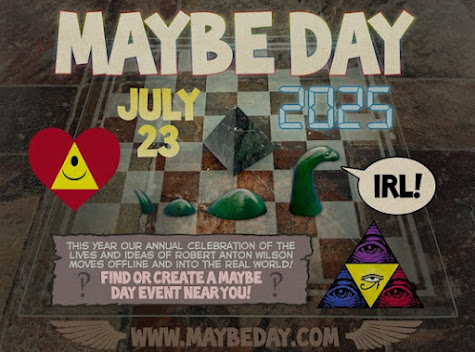[As I have mentioned before, I am an active member of the Libertarian Futurist Society. RAW was the presenter for the first Prometheus Award and Robert Shea was active in the Libertarian Futurist Society. -- The Management]
The Libertarian Futurist Society, a nonprofit all-volunteer international organization of freedom-loving science fiction fans, has announced Prometheus Award Best Novel and Best Classic Fiction winners.
The 45th annual Prometheus Awards will be presented online in a Zoom awards ceremony open to the public, most likely on a Saturday or Sunday afternoon in late August or early September. David Friedman, an SF/fantasy novelist and a leading economist and libertarian thinker, will be a speaker and guest presenter.
The Prometheus Award for Best Novel
In the Belly of the Whale, by Michael Flynn, won the 2025 Prometheus Award for Best Novel for novels published in 2024.
The posthumous work, published by CAEZIK SF & Fantasy, explores the complex lives, work, challenges and conflicts of 40,000 human colonists aboard a large asteroid ship two centuries into a projected eight-century voyage to Tau Ceti.
With its intricate world-building, believable characters in conflict, and profound grasp of human nature, the epic social novel freshens the SF subgenre of the multi-generational colony ship while raising deeper questions about the enormous difficulties of our species expanding beyond our solar system.
Beyond the usual technological and interpersonal issues of maintenance and survival that naturally arise, the colonists suffer from a dysfunctional bureaucracy, crew class divisions, and a traditional shipboard command structure that has calcified into an authoritarian hereditary aristocracy with enforced eugenics and a loss of focus on the mission goal.
Flynn’s kaleidoscopic novel is a wise cautionary tale and poignant libertarian tragedy about the underestimated challenges facing our species as we dream of someday establishing a beachhead of human civilization beyond our solar system.
Without sustaining the culture of liberty, self-reliance and voluntary cooperation that helped lift Earth civilizations to unprecedented levels of knowledge and prosperity, humanity may be doomed even if such ships reach their distant destinations.
Reflecting Flynn’s well-earned reputation for a high level of craftsmanship and a wintry poetic style, his last novel is an ambitious saga of power, decay and revolution embodying an enduring theme: The price of freedom (and survival) is eternal vigilance.
Visit the Prometheus blog for a full review of In the Belly of the Whale that illuminates how it fits the distinctive dual focus of the Prometheus Award on quality and liberty.
In the Belly of the Whale was the last novel Flynn wrote before his death in 2023 at 75. Flynn previously won two Prometheus Awards for Best Novel for In the Country of the Blind (in 1991) and Fallen Angels (in 1992), the latter co-written with Larry Niven and Jerry Pournelle.
The other 2024 Best Novel finalists were Alliance Unbound, by C. J. Cherryh and Jane S. Fancher (DAW); Cancelled: The Shape of Things to Come, by Danny King (Annie Mosse Press); Beggar’s Sky, by Wil McCarthy (Baen Books); and Mania, by Lionel Shriver (HarperCollins Publishers).
The Prometheus Hall of Fame for Best Classic Fiction
Orion Shall Rise, a 1983 novel (Timescape) by Poul Anderson, won the 2025 Best Classic Fiction award and will be inducted into the Prometheus Hall of Fame.
First nominated for the Prometheus Award in 1984, when it was a Best Novel finalist, Orion Shall Rise explores the corruptions and temptations of power and how a free society might survive and thrive after a post-nuclear-war apocalypse on a largely depopulated Earth.
A nearly pure example of social scientific world-building in its plausible economies, polities and cultures, the novel depicts four renascent but very different civilizations in conflict over the proper role of technology. Among them: the Maurai, a constitutional monarchy derived from Polynesian societies; the Mong, a feudal society descended from Russian, Mongolian and Chinese refugees who conquered much of North America; and Skyholm, a technologically advanced aristocracy centered on France and dominated by a lighter-than-air city structure.
Perhaps most intriguing is the Northwest Union, a decentralized and strongly technophilic society that extends roughly from Oregon to Alaska: a culture founded in resistance to the Mong invasion. The Union’s minimal central government, voluntary Lodges and other strong tendencies to libertarianism embody one of Anderson’s more attractive portrayals of this idea.
Avoiding a straight-forward clash of good people with evil, the story creates believable and sympathetic characters representing the best of each culture. Anderson plays fair to all sides, a hallmark of the work of the SFWA Grand Master.
Ultimately, Orion Shall Rise offers a hopeful vision of forward-thinking visionaries who dream of reaching for the stars while trying to revive the forbidden nuclear technology that destroyed their previous civilization.
Visit the Prometheus blog for a full review of Orion Shall Rise that illuminates how it fits the distinctive dual focus of the Prometheus Award on quality and liberty.
Anderson (1926-2001), the first author to receive a Special Prometheus Award for Lifetime Achievement in 2001, was a major American science fiction writer who won the Hugo Award seven times, the Nebula Award three times and the Prometheus Award seven times (including this year’s award).
This is Anderson’s fifth work to be inducted into the Prometheus Hall of Fame, following Trader to the Stars (in 1985), The Star Fox (in 1995), “No Truce with Kings” (in 2010) and “Sam Hall” (in 2020.)
The other Prometheus Hall of Fame finalists were “As Easy as A.B.C.,” a 1912 story by Rudyard Kipling; ”The Trees," a 1978 song by the Canadian rock group Rush; and Singularity Sky, a 2003 novel (Ace Books) by Charles Stross.
Prometheus Awards History
The Prometheus Awards, sponsored by the Libertarian Futurist Society (LFS), was first presented in 1979, making it one of the most enduring awards after the Nebula and Hugo awards, and one of the oldest fan-based awards currently in sf.
For more than four decades, the Prometheus Awards have recognized outstanding works of science fiction and fantasy that dramatize the perennial conflict between liberty and power, favor cooperation over coercion, expose the abuses and excesses of coercive government, and/or critique or satirize authoritarian systems, ideologies and assumptions.
Above all, the Prometheus Awards strive to recognize speculative fiction that champions individual rights, based on the moral/legal principle of non-aggression as the ethical and practical foundation for peace, prosperity, progress, justice, tolerance, mutual respect, civility and civilization itself.
All LFS members have the right to nominate eligible works for all categories of the Prometheus Awards, while publishers and authors are welcome to submit potentially eligible works for consideration using the form linked from the LFS website’s main page at www.lfs.org
While the Best Novel category is limited to novels published in English for the first time during the previous calendar year, Hall of Fame nominees — which must have been published, performed, broadcast or released at least 20 years ago — may be in any narrative or dramatic form, including novels, novellas, stories, films, television series or episodes, plays, musicals, graphic novels, song lyrics, or verse.
The Best Novel winner receives a plaque with a gold coin, and the Hall of Fame winner, a plaque with a smaller gold coin.
























.jpg)


.jpg)
